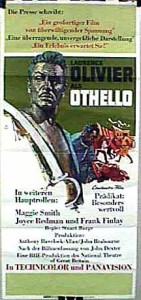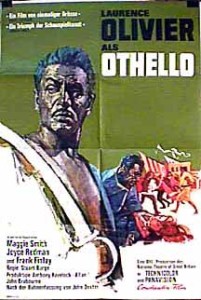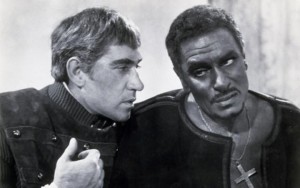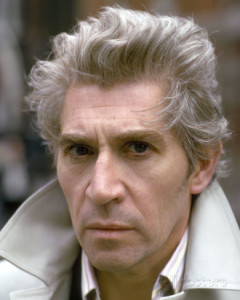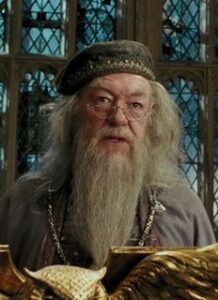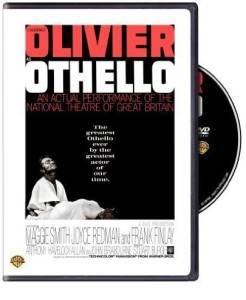Othello **** (1965, Laurence Olivier, Frank Finlay, Maggie Smith, Joyce Redman, Derek Jacobi, Michael Gambon) – Classic Movie Review 3,339
Stage director John Dexter’s legendary acclaimed Chichester Festival and National Theatre of Great Britain production of Othello is plainly transferred to film by director Stuart Burge, but it is nevertheless a compelling experience. It records for ever Olivier’s brilliant, extravagant performance as Othello, The Moor of Venice, the general who questions his wife’s fidelity, and that of Frank Finlay in his Best Supporting Actor Oscar-nominated role as his vengeful lieutenant Iago, as well as Maggie Smith’s Desdemona.
Though perhaps some of the magic it must have had on stage has perhaps been obscured, this Othello is still powerful on screen, even after all these years, and it is still a hugely effective experience of Shakespeare’s great tragedy. Olivier, Finlay, Joyce Redman and Maggie Smith all received Oscar nominations. and it is the only Shakespeare film in which all the principals were nominated for Oscars. Incidentally, at 90 minutes, Finlay’s performance is the longest ever nominated for a supporting acting Oscar, only three minutes shorter than Olivier’s. And Finlay has the most lines in the play: 1117 lines to Olivier’s 856.
Of course Olivier’s black-face make-up looks uncomfortable now, and so does the rolling of his eyes and his odd walk. But his deep-toned verse speaking is magnificent, along with the beautiful verse speaking of the rest of the cast, clarifying why this was one of the important theatre experiences of its day.
And the cast of Sixties brilliant actors shows its special allure. A long roster of famous names must still be seen, relished, honoured and respected: Finlay as an intensely calculating Iago, Maggie Smith as Desdemona, Joyce Redman as Emilia and Derek Jacobi (in his film debut) as Cassio, Robert Lang as Roderigo, Anthony Nicholls as Brabantio, Roy Holder (Clown), Sheila Reid, Michael Turner, Kenneth MacKintosh, Terence Knapp, Keith Marsh, Tom Kempinski, Edward Hardwicke, Peter Cellier, Michael Gambon (in his film debut, as Senator/ Soldier/ Cypriot) and John McEnery.
It is a near exact filming of a stage production that featured little music, and the roadshow release does not feature the usual overture, intermission music and exit music. Iago and the soldiers sing a drinking song and musicians briefly play on exotic instruments, but that’s the only music.
The film runs 165 minutes, keeps most of Shakespeare’s play, and does not change the order of scenes, as do Olivier’s Hamlet and Richard III. Minor lines are cut and the only major loss is the Fool’s scene, although the theatre performance kept more of the play than the film. It uses enlarged duplicates of the original stage settings, saving money to film on location or on elaborate sets.
The cast are Laurence Olivier as Othello, Maggie Smith as Desdemona, Joyce Redman as Emilia, Frank Finlay as Iago, Derek Jacobi as Cassio, Robert Lang as Roderigo, Kenneth MacKintosh as Lodovico, Anthony Nicholls as Brabantio, Sheila Reid as Bianca, Edward Hardwicke as Montano, Michael Gambon as Senator/Soldier/Cypriot, Roy Holder (Clown), Michael Turner, Terence Knapp, Keith Marsh, Tom Kempinski, Peter Cellier, and John McEnery.
The National Theatre Company had previously filmed Chekhov’s Uncle Vanya (1963) and later filmed Strindberg’s The Dance of Death (1969).
Previously, Orson Welles gives a noble, layered performance of great majesty and power as Othello, The Moor of Venice, in his lovingly made 1952 film Othello, which won the joint Palme D’Or prize at the Cannes Film Festival in 1952. Sergei Bondarchuk plays the Moor in a famous 1955 Russian film Othello. Oliver Parker’s version Othello followed in 1995 with Laurence Fishburne, Irène Jacob and Kenneth Branagh as Iago. Mekhi Phifer and Josh Hartnett appeared in O in 2001, an updated version with a young cast, set in an upper-class prep school and centred on basketball player Odin, with Josh Hartnett as the Iago character.
Frank Finlay CBE was born on 6 August 1926 and died on 30 January 2016.
Michael Gambon was one of the original members of Laurence Olivier’s Royal National Theatre and made his film debut in Olivier’s Othello (1965).
Michael Gambon died in hospital on 28 September 2023, aged 82, after suffering from pneumonia. He made his film debut in Othello (1965) and is remembered for The Cook, the Thief, His Wife & Her Lover (1989), The Wings of the Dove (1997), The Insider (1999), Gosford Park (2001), Amazing Grace (2006), The King’s Speech (2010), Quartet (2012), and Victoria & Abdul (2017), The Life Aquatic with Steve Zissou (2004), Fantastic Mr Fox (2009), and as Albus Dumbledore in the Harry Potter films from 2004 to 2011.
Sir Michael Gambon (19 October 1940 – 28 September 2023) was one of the original members of Laurence Olivier’s Royal National Theatre. He won three Olivier Awards, two Screen Actors Guild Awards, and four BAFTA Awards, and was knighted by Queen Elizabeth II in 1998 for services to drama. Michael Gambon plays headmaster Professor Albus Dumbledore in 2004’s Harry Potter and the Prisoner of Azkaban and Harry Potter and the Goblet of Fire (2005) and onwards, replacing Richard Harris, who died in 2002.
© Derek Winnert 2016 Classic Movie Review 3,339
Link to Derek Winnert’s home page for more reviews: http://derekwinnert.com/

